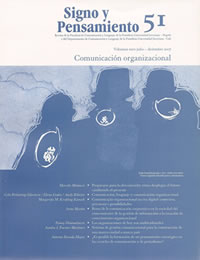Abstract
The Information Society (IS) is the framework where “intelligent corporations or learning organizations” are moving. It is in such organizations where appropriate information management, the subject matter of corporate communication, is more meaningful. The competitiveness that IS brings about makes it necessary for corporate communication to face new challenges, new functions and new strategies. The information circulating in corporations and organizations should become relevant knowledge. Therefore, this article will show the relationship between corporate communication and knowledge management. The approach focuses on companies’ better knowledge of their own organization, so that they can become more competitive. In order to evaluate the transformations accomplished through knowledge management, it is necessary to acknowledge the relation that exists between strategic information management and the creation of organizational knowledge. Communication is essential for the diffusion and reutilization of knowledge. Acquired knowledge is used to create new knowledge, and these two are applied in corporate development and corporate problem solving.This journal is registered under a Creative Commons Attribution 4.0 International Public License. Thus, this work may be reproduced, distributed, and publicly shared in digital format, as long as the names of the authors and Pontificia Universidad Javeriana are acknowledged. Others are allowed to quote, adapt, transform, auto-archive, republish, and create based on this material, for any purpose (even commercial ones), provided the authorship is duly acknowledged, a link to the original work is provided, and it is specified if changes have been made. Pontificia Universidad Javeriana does not hold the rights of published works and the authors are solely responsible for the contents of their works; they keep the moral, intellectual, privacy, and publicity rights.
Approving the intervention of the work (review, copy-editing, translation, layout) and the following outreach, are granted through an use license and not through an assignment of rights. This means the journal and Pontificia Universidad Javeriana cannot be held responsible for any ethical malpractice by the authors. As a consequence of the protection granted by the use license, the journal is not required to publish recantations or modify information already published, unless the errata stems from the editorial management process. Publishing contents in this journal does not generate royalties for contributors.


